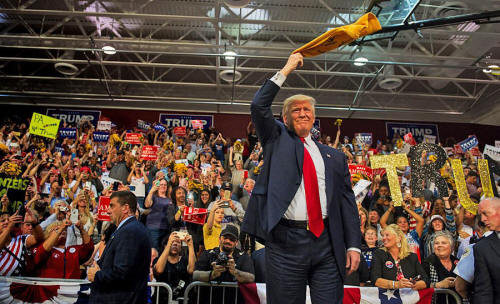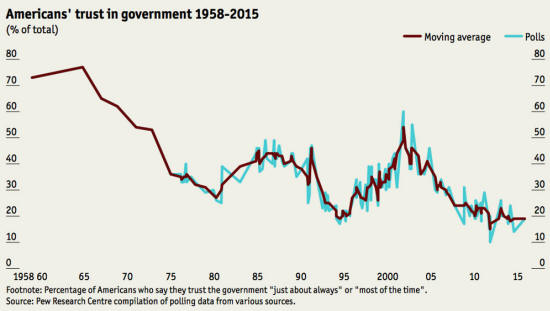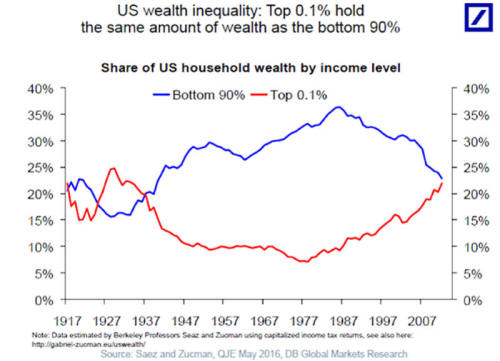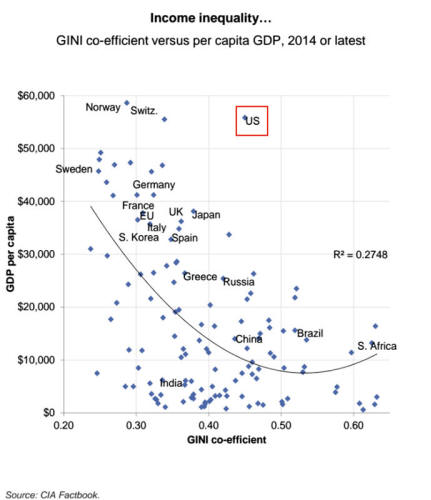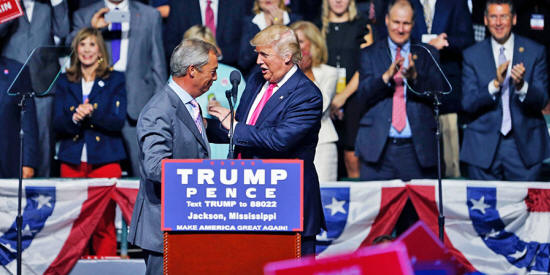|
from
BusinessInsider Website
a symbol of distress, as protesters against the Vietnam War march past the White House from their encampment on the Mall, April 22, 1971.
Henry Burroughs/AP
to a "flawed democracy" by the Economist Intelligence Unit.
confidence in governmental institutions, according to the EIU.
since the late 1950s, according to data from Pew Research.
Moreover, inequality in the U.S. has been on the rise, according to data from Deutsche Bank and Goldman Sachs.
Rather, they argue, his
surprise election was an effect of the underlying causes that led
the EIU to downgrade the U.S..
Meanwhile, "flawed democracies",
However, there are
governance problems and low levels of political participation.
The analysts write that a key factor in the drop was Americans' growing distrust in governmental institutions.
Notably, they write that even if 2016 weren't an election year, the US's score would've dipped below 8.00.
As a reference point, other countries that qualify as "flawed democracies" and have similar scores on the EIU metrics as the U.S. include,
using data from Pew Research Center
Americans' trust in government has been declining since the late 1950s.
And after an uptick from the mid-1990s to the early 2000s, confidence again dropped, according to Pew Research data cited by the EIU. In fact, the percentage of Americans who say they trust the government "just about always" or "most of the time" dropped to less than 20% in the mid-2010s.
The EIU argues that there are several reasons for this decline.
First, major political events over the past several decades, including the Vietnam War, the Watergate scandal, the Iraq War, the financial and housing crisis in 2008-2009, and government shutdowns, have eroded Americans' trust in government.
Additionally, the EIU argues that rising income inequality has been an underlying factor in growing distrust.
Deutsche Bank
On that note, a few months back Deutsche Bank's chief international economist Torsten Sløk sent around a chart to clients showing the share of U.S. household wealth by income level.
The takeaway? The top 0.1% of American households now hold about the same amount of wealth as the bottom 90%.
Moreover, the U.S. happens to be a big outlier when it comes to inequality.
In August, Goldman Sachs' Sumana Manohar and Hugo Scott-Gall shared a chart comparing a given country's gross domestic product per capita to its Gini coefficient.
Goldman Sachs
The Gini coefficient is a measurement of the income distribution within a country that aims to show the gap between the rich and the poor.
The number ranges from zero to one, with zero representing perfect equality (everyone has the same income) and one representing perfect inequality (one person earns the entire country's income and everyone else has nothing.)
A higher Gini coefficient means greater inequality.
Developed market economies such as those in,
...tend to have a higher GDP per capita and lower Gini coefficients.
On the flip side, emerging market economies in countries like,
...tend to have a lower GDP per capita but a higher Gini coefficient.
However, the US's GDP per capita is on par with developed European countries like,
...but its Gini coefficient is in the same tier as Russia's and China's.
As for Europe
But the U.S. is not the sole country to have a decline in confidence in political elites and institutions.
Major European economies have also seen this trend.
In June, Britons voted to leave the EU in the Brexit vote, while populist movements have been on the rise across the continent.
(As an aside on the "connecting with people" point, the EIU notes that Trump and his team "cleverly used social media, especially Twitter, to flatten the media and reach people directly.")
Donald Trump and Nigel Farage. Gerald Herbert/AP
That being said, unlike for the U.S., post-Brexit UK is still a "full democracy" and its score increased - to 8.36 in 2016 from the prior year's reading of 8.31 - because of increased political participation with the Brexit vote.
The referendum drew a turnout of 72.2%, compared with average turnouts of 63% in the four general elections since 2001.
In any case, the EIU team also argues in their report that both the election of Donald Trump and the Brexit vote should be taken seriously.
***
These 9 animated maps will change how you see the world:
|



